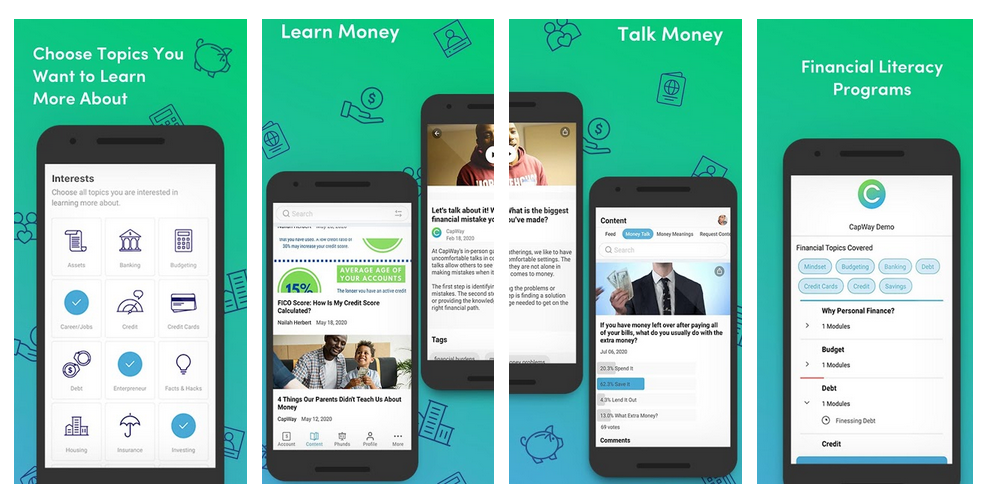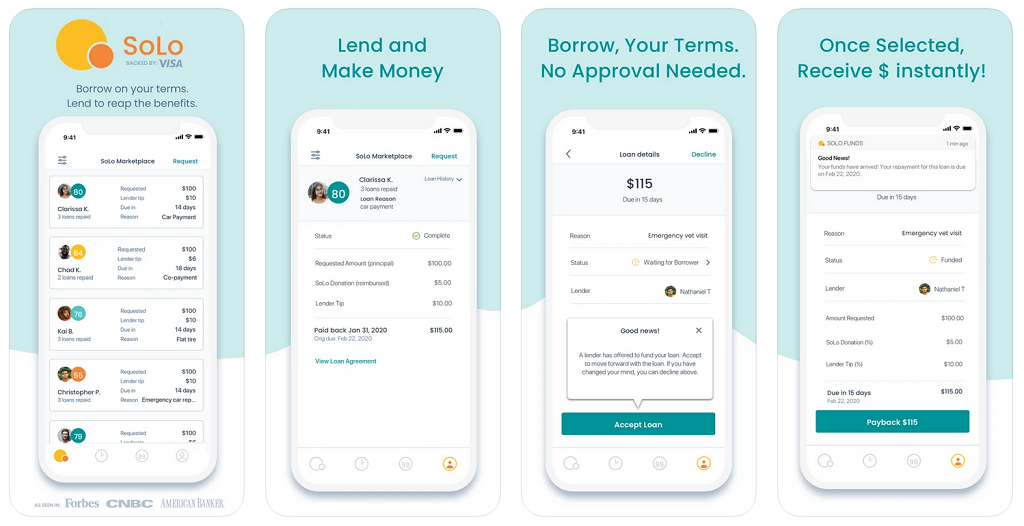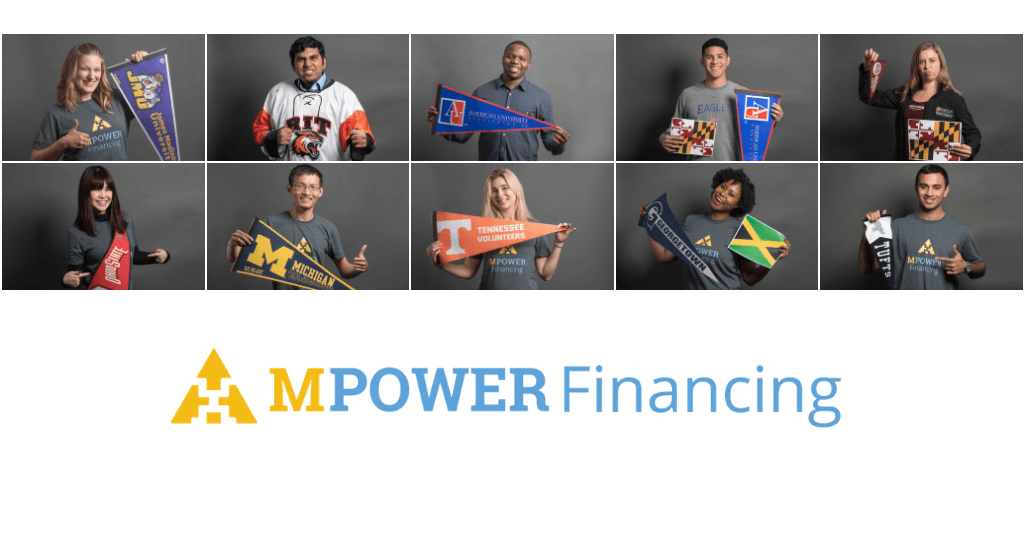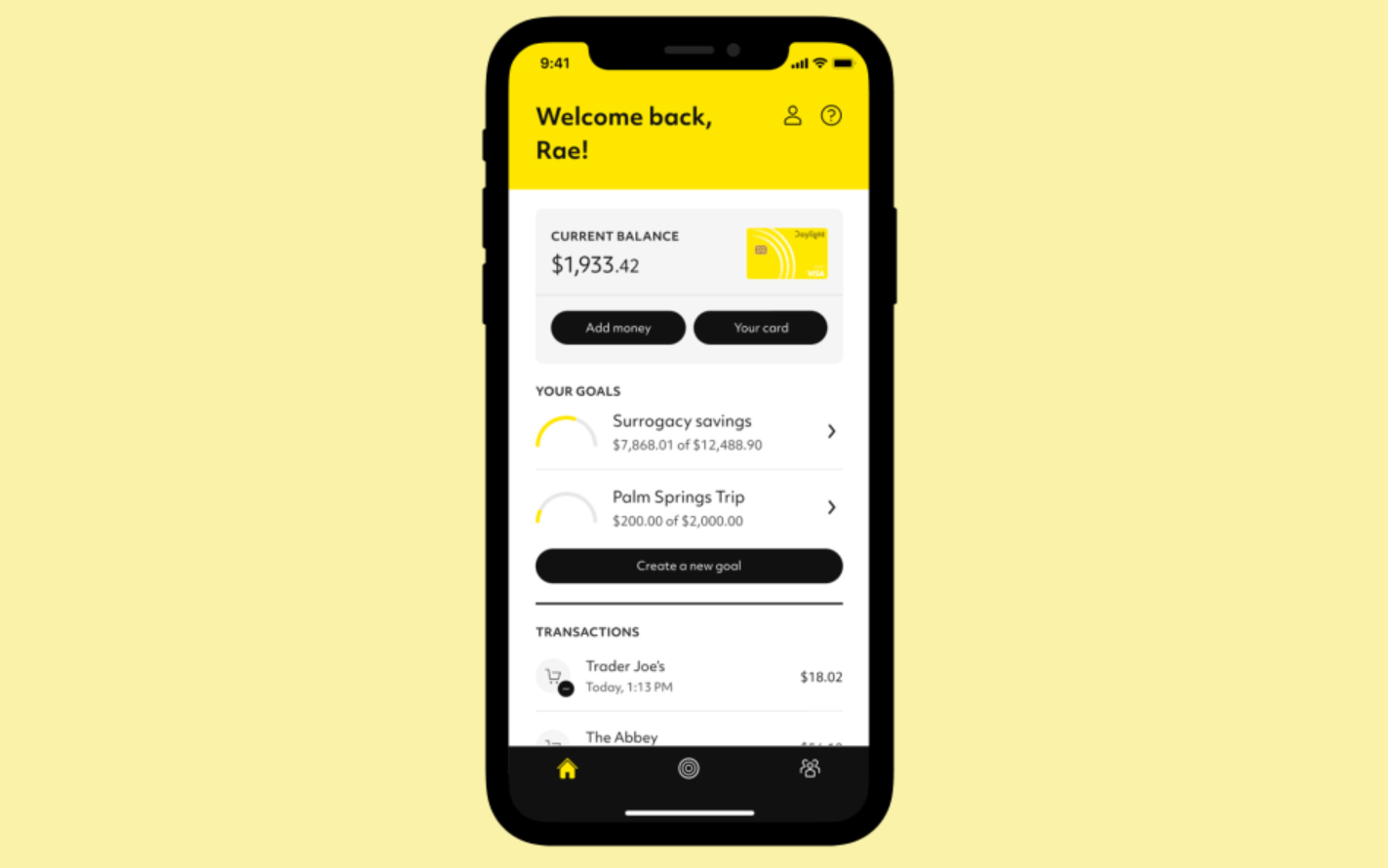And improve the lives of minorities

Financial inclusion: banks for LGBT people and services for migrants.
Back in 2010, InvestmentNews announced that representatives of social minorities can significantly enrich the financial sector. However, as noted President of Harris & Harris Wealth Management Group Zaneyliya Harris in the June publication, many financial institutions are aimed at affluent consumers with liquid assets of more than $ 1 million. The banks and FCCU themselves indulge in more customers, because the really rich make up only 10% of the country's population. If financial institutions became more inclusive, this would open up access to a client base of more than one hundred million people - according to an expert study, about 50% of Americans (without reference to their race) have less than $ 100 thousand in their accounts.

CapWay is a neobank founded by a young African American Sheena Allen. According to her, the idea to create her own business came to her because of problems with financial inclusion in her hometown, where the entire local population was served by only one bank. The startup's goal is to provide access to financial services to 30 million Americans without a bank account, in particular people with low income. To attract consumers, CapWay focuses on the absence of hidden fees and transparency of its work.

Another service, SoLo Funds, also targets low-income consumers, more specifically, people living paycheck to paycheck. The platform offers access to various loan offers through a mobile application. At the same time, clients themselves set the amount and terms of repayment of the loan, which they can receive on the day of application.

Company MPOWER Financing provides loans ranging from $ 2 thousand to 50 thousand students to study in the US and Canada without reference to credit history. Users can use the loans to cover all university-related expenses including tuition, textbooks, meals, housing, and health insurance. During their studies and during the 6-month grace period after graduation, students can only pay interest on the loan. Loan repayment is available online in any currency. Reportedly, MPOWER's mission is to reduce financial barriers to international education.
Greenwood is founded by Ryan Glover, creator of the cable network Bounce TV, and activist rapper Michael "Killer Mike" Render. The company, which also includes former Atlanta Mayor Andrew Young, raised more than $ 3 million in seed funding in June this year.
Tenth launched Neobank for African Americans in November . The startup's name refers to the essay "The Talented Tenth" by African American public figure William Edward Burckhardt Dubois. He advocated for a talented tenth for black Americans to get higher education for the benefit of the community.
The mission of the project is reportedly to close the wealth gap by improving financial literacy. In particular, the bank helps clients keep track of their money, accumulate savings, gain access to insurance, wealth management and financial advice in real time.
To open an account, you must reside in any country in the European Economic Area (EU countries, Norway, Iceland and Liechtenstein). The bank also has a multilingual support team and an application in 14 languages: English, French, German, Brazilian Portuguese, European Portuguese, Bulgarian, Italian, Spanish, Romanian, Polish, Czech, Turkish, Estonian and Lithuanian.
Three tariff plans are available to customers: a free multicurrency account with a commission for some deposits and transfers, a “classic” account for £ 5.95 per month with higher top-up limits and reduced transfer rates, and a “premium” account for £ 14.95 with unlimited withdrawing funds and spending in foreign currency, as well as the absence of commissions for account replenishment and transfers.
American money transfer startup Remitly announced the launch of Passbook, a multicultural neobank earlier this year .
Users have access to a Visa debit card with a cashback of $ 2 for each money transfer transaction using the Remitly service. Customers can open and use bank accounts even if they do not have a Social Security number or other proof of US residency. At the same time, clients can use the passport of their country and documents with information about the place of residence.
Passbook does not charge users "typical" banking fees, including minimum balance, maintenance, overdraft, ATM withdrawals, transfers, service charges, card reissue, and more.

In December, a beta version of Daylight's first mobile bank will be launched, targeting the LGBT community. Users will receive a prepaid Visa card in their preferred name, which may not match their passport details. Also, clients will have access to services to improve their financial habits, personalized financial advice from experts and the ability to make direct donations to charities associated with LGBT +.
Recall that in 2019, Mastercard introduced the True Name product - a payment card that can be ordered for an alternate username. In the US, the service is currently available to customers of Citi and BMO Harris Bank. In July, Mastercard also announced the launch of this service in Europe.
By the way, this year, some consumers of financial services took up arms against the Ukrainian PrivatBank because of the "rainbow" avatar on Instagram. In June, the financial institution decided to express its support for the LGBT festival "Kiev Pride" in this way. Some users positively assessed the bank's action, but there were also those who left negative comments, including threatening to go to competitors.
In October, gamers also received a special card. American gaming equipment manufacturer Razer has released a Razer Card debit card with cashback in partnership with Visa. The beta testing of the product has already begun in Singapore. The card makes it possible to earn game rewards. These bonuses can then be used in the Razer Pay app. A feature of the card is the glow of the logo during use.
PrivatBank also has an interactive educational program for children of the bank's VIP clients. In addition to children, the state bank has also launched an educational project for parents, “Your Own Banker,” which teaches older customers to use all banking services without leaving home through the Privat24 application and Privat24 mobile bank.
PAYSPACE MAGAZINE HELP
As a reminder, in August, the National Bank oannounced that, together with the International Finance Corporation (IFC), which is part of the World Bank Group, it would work to increase financial inclusion.
So, within the framework of cooperation with IFC, the National Bank plans to:

Financial inclusion: banks for LGBT people and services for migrants.
Back in 2010, InvestmentNews announced that representatives of social minorities can significantly enrich the financial sector. However, as noted President of Harris & Harris Wealth Management Group Zaneyliya Harris in the June publication, many financial institutions are aimed at affluent consumers with liquid assets of more than $ 1 million. The banks and FCCU themselves indulge in more customers, because the really rich make up only 10% of the country's population. If financial institutions became more inclusive, this would open up access to a client base of more than one hundred million people - according to an expert study, about 50% of Americans (without reference to their race) have less than $ 100 thousand in their accounts.
Almost a decade ago, the World Bank cited increasing financial inclusion as a key factor in fighting poverty and improving overall welfare. Earlier, we talked in detail about how banks, financial companies and regulators help the WB in achieving this goal. Today, PaySpace Magazine shares a selection of financial market services and services aimed at improving the quality of life of social minorities and reducing inequality.“As a result, I see my colleagues targeting this small group exclusively, rather than helping less affluent people who are striving for a better life and economic situation,” said Harris.
Financial services for people with low income

CapWay is a neobank founded by a young African American Sheena Allen. According to her, the idea to create her own business came to her because of problems with financial inclusion in her hometown, where the entire local population was served by only one bank. The startup's goal is to provide access to financial services to 30 million Americans without a bank account, in particular people with low income. To attract consumers, CapWay focuses on the absence of hidden fees and transparency of its work.
“When it comes to your money, we try to save you from guesswork and surprises,” says the bank's website.

Another service, SoLo Funds, also targets low-income consumers, more specifically, people living paycheck to paycheck. The platform offers access to various loan offers through a mobile application. At the same time, clients themselves set the amount and terms of repayment of the loan, which they can receive on the day of application.
Student loans

Company MPOWER Financing provides loans ranging from $ 2 thousand to 50 thousand students to study in the US and Canada without reference to credit history. Users can use the loans to cover all university-related expenses including tuition, textbooks, meals, housing, and health insurance. During their studies and during the 6-month grace period after graduation, students can only pay interest on the loan. Loan repayment is available online in any currency. Reportedly, MPOWER's mission is to reduce financial barriers to international education.
Mobile banks for BIPOC
In October, Greenwood, a mobile bank for African Americans and Hispanics, individuals and entrepreneurs , was launched in the United States . The startup's financial services include checking and savings accounts, deposits and P2P transfers, a global ATM network, Apple and Android Pay, and two-day payday advances for customers using Direct Deposit.Greenwood is founded by Ryan Glover, creator of the cable network Bounce TV, and activist rapper Michael "Killer Mike" Render. The company, which also includes former Atlanta Mayor Andrew Young, raised more than $ 3 million in seed funding in June this year.
Tenth launched Neobank for African Americans in November . The startup's name refers to the essay "The Talented Tenth" by African American public figure William Edward Burckhardt Dubois. He advocated for a talented tenth for black Americans to get higher education for the benefit of the community.
The mission of the project is reportedly to close the wealth gap by improving financial literacy. In particular, the bank helps clients keep track of their money, accumulate savings, gain access to insurance, wealth management and financial advice in real time.
Services for migrants
In 2015, Monese, the first mobile bank for migrants and expats, launched in the UK. The startup was founded by Norris Koppel, a native of Estonia, who at one time himself faced bureaucratic difficulties while trying to open a bank account in the United Kingdom. Among the list of services provided: instant account opening through a mobile application, monitoring of its current status, cheap global payments and a contactless debit card. The app also allows you to set a weekly or monthly budget.To open an account, you must reside in any country in the European Economic Area (EU countries, Norway, Iceland and Liechtenstein). The bank also has a multilingual support team and an application in 14 languages: English, French, German, Brazilian Portuguese, European Portuguese, Bulgarian, Italian, Spanish, Romanian, Polish, Czech, Turkish, Estonian and Lithuanian.
Three tariff plans are available to customers: a free multicurrency account with a commission for some deposits and transfers, a “classic” account for £ 5.95 per month with higher top-up limits and reduced transfer rates, and a “premium” account for £ 14.95 with unlimited withdrawing funds and spending in foreign currency, as well as the absence of commissions for account replenishment and transfers.
American money transfer startup Remitly announced the launch of Passbook, a multicultural neobank earlier this year .
Users have access to a Visa debit card with a cashback of $ 2 for each money transfer transaction using the Remitly service. Customers can open and use bank accounts even if they do not have a Social Security number or other proof of US residency. At the same time, clients can use the passport of their country and documents with information about the place of residence.
Passbook does not charge users "typical" banking fees, including minimum balance, maintenance, overdraft, ATM withdrawals, transfers, service charges, card reissue, and more.
Neobank and cards for LGBT +

In December, a beta version of Daylight's first mobile bank will be launched, targeting the LGBT community. Users will receive a prepaid Visa card in their preferred name, which may not match their passport details. Also, clients will have access to services to improve their financial habits, personalized financial advice from experts and the ability to make direct donations to charities associated with LGBT +.
Recall that in 2019, Mastercard introduced the True Name product - a payment card that can be ordered for an alternate username. In the US, the service is currently available to customers of Citi and BMO Harris Bank. In July, Mastercard also announced the launch of this service in Europe.
By the way, this year, some consumers of financial services took up arms against the Ukrainian PrivatBank because of the "rainbow" avatar on Instagram. In June, the financial institution decided to express its support for the LGBT festival "Kiev Pride" in this way. Some users positively assessed the bank's action, but there were also those who left negative comments, including threatening to go to competitors.
Blogger cards
It might seem like influencers have no problem accessing financial services, but they are not. Many young bloggers, despite their large earnings, are denied loans due to mediocre credit ratings. It is for such clients that the American fintech startup Karat has presented its first product, the Karat Black Card, a credit card for content creators on YouTube, Twitch and other popular Internet platforms. Bloggers and streamers can use the Karat Black Card for business-related expenses. So, after the approval of the application, the cardholder can count on a loan of $ 250 for the purchase of electronics and other equipment. The card has cashback on purchases from 2% to 5%, and also offers advances for sponsorship payments.In October, gamers also received a special card. American gaming equipment manufacturer Razer has released a Razer Card debit card with cashback in partnership with Visa. The beta testing of the product has already begun in Singapore. The card makes it possible to earn game rewards. These bonuses can then be used in the Razer Pay app. A feature of the card is the glow of the logo during use.
Financial inclusion
The principle of financial inclusion is presented in the form of services for children and adolescents. Earlier, the editorial staff of PaySpace Magazine told in an extensive article about what products FinTech companies and classic banks, including Ukrainian ones, offer to children. So, children's cards in our country are issued by PrivatBank, Raiffeisen Bank Aval, Oschadbank , monobank, Alfa-Bank, Bank Pivdenny, etc.PrivatBank also has an interactive educational program for children of the bank's VIP clients. In addition to children, the state bank has also launched an educational project for parents, “Your Own Banker,” which teaches older customers to use all banking services without leaving home through the Privat24 application and Privat24 mobile bank.
PAYSPACE MAGAZINE HELP
As a reminder, in August, the National Bank oannounced that, together with the International Finance Corporation (IFC), which is part of the World Bank Group, it would work to increase financial inclusion.
So, within the framework of cooperation with IFC, the National Bank plans to:
- introduce new financial products for citizens and small businesses;
expand access to accounts and loans with financial institutions;
make financial services more accessible, better quality and more usable; - to ensure the protection of the rights of consumers of financial services.
